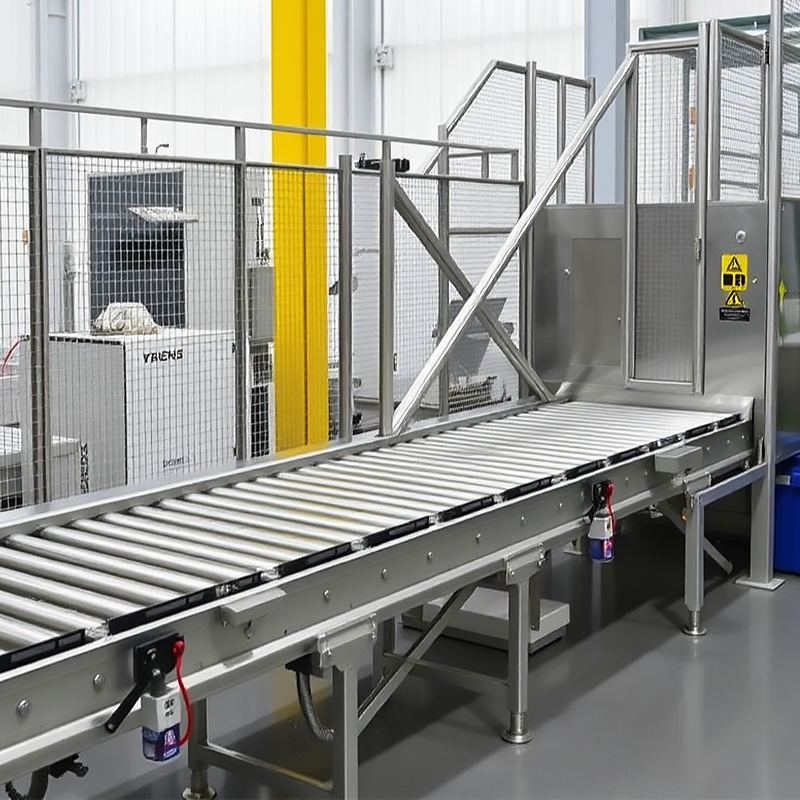Our roller conveyors are built for efficient material handling across various industries. They feature a flexible design that accommodates straight, curved, or inclined layouts and can handle diverse materials, including boxes, bags, and pallets.
With low maintenance costs, high durability, and easy integration into automated systems, these conveyors optimize production processes while ensuring safety and hygiene.
Descriptio
Toshine Automatic Pallet Roller Conveyors
Roller Conveyors Line Description
Structural Form: Roller conveyors lines can be classified based on their driving mode into powered and unpowered options. So we can also categorize them by layout into horizontal, inclined, and turning roller lines. Besides, custom designs are available to meet specific customer requirements.
Standard inner widths for roller lines include 200, 300, 400, 500, and 1200 mm, with other special specifications available upon request. The standard turning inner radii for turning roller lines are 600, 900, and 1200 mm, with additional custom sizes also offered. Therefore, the diameters for straight rollers typically range from 38 to 89 mm.

Basic Information on Roller Conveyors Lines
Materials Used: Roller conveyors lines are constructed from various materials including carbon steel, stainless steel, aluminum, PVC, and plastic steel.
Driving Modes: The driving options for roller conveyors lines include reduction motor drives and electric roller drives.
Speed Regulation Methods: These lines can utilize frequency conversion speed regulation or electronic speed regulation.
Application Range: Roller conveyors lines are suitable for diverse industries. Such as electronics, beverages, food, packaging, machinery, light industry, tobacco, chemicals, pharmaceuticals, rubber and plastics, automobiles, logistics, and more. Transmission modes include single sprocket, double sprocket, O-belt, flat friction drive belt, and synchronous belt.
Equipment Features: Roller conveyors lines are easy to connect and filter, allowing for the integration of multiple roller lines and other conveying equipment to create various logistics systems. Therefore, they are including diversion and confluence systems tailored to specific process needs.
Technical Parameters for Customized Roller Conveyors Lines
To ensure optimal functionality, please confirm the following technical parameters:
- Length, width, and height of the conveyed objects.
- Weight of each conveying unit.
- Bottom condition of the conveyed object.
- Any special environmental requirements (such as humidity, high temperature, or exposure to chemicals).
- Specify whether the conveyor is unpowered or motor-driven. At least one roller must maintain contact with the conveyed object at all times. For soft bag packaging, pallets may be required as necessary.
Roller Selection for Conveyor Lines
Roller Length: Choose roller lengths based on the width of the goods being conveyed, typically using the formula “conveying object + 50 mm.”
Roller Wall Thickness and Shaft Diameter: Determine the roller wall thickness and shaft diameter based on the weight of the conveyed items, ensuring even distribution of load across the contacting rollers.
Roller Material and Surface Treatment: Select roller materials and surface treatments according to the specific conveying environment. Such as carbon steel, galvanized stainless steel, blackened, or rubber-coated finishes.
Installation Method: Choose the roller installation method based on the overall conveyor requirements. Options include spring press type, internal tooth shaft type, full flat tenon type, and through shaft pin hole type. For tapered rollers in curve applications, the surface width and taper depend on the size of the goods and the turning radius.
Key Benefits of Roller Conveyors
- High Efficiency: Roller conveyors excel at continuously transporting materials, significantly boosting production and logistics efficiency.
- Low Maintenance Cost: With their simple structure, roller conveyors require minimal maintenance, leading to lower operational costs.
- Flexibility: We can customize these conveyors into straight, curved, or inclined designs to fit various production line layouts.
- Wide Applicability: Roller conveyors are versatile and can handle materials of different shapes, sizes, and weights, including boxes, bags, and pallets.
- Easy Integration: The conveyor system can seamlessly connect with other conveying equipment or automation systems. So it can form a comprehensive automated production line.
Other Benefits
- Easy Operation: Operators can easily control the conveyor’s start, stop, and speed adjustments using a user-friendly control panel.
- Safety Features: Modern roller conveyors come equipped with safety guards, such as emergency stop buttons and guardrails, ensuring safe operation.
- Durability: Crafted from high-quality rollers and carefully chosen materials, these conveyors offer a long service life.
- Scalability: You can easily adjust the conveying capacity by adding or removing rollers based on changing production demands.
- Energy Saving: Roller conveyors typically require minimal power to operate, making them an economical choice for energy consumption.
- Reduced Labor Costs: The automation of the conveying process decreases the reliance on manual labor, leading to lower labor costs and enhanced efficiency.
- Improved Accuracy: These conveyors can precisely control the speed and positioning of materials, reducing the likelihood of errors.
- Easy to Clean and Hygienic: Designed for easy cleaning, roller surfaces are ideal for environments that require strict hygiene standards. Such as the food and pharmaceutical industries.
- Modular Design: Many roller conveyors feature a modular design, allowing for quick installation and effortless replacement of parts.





